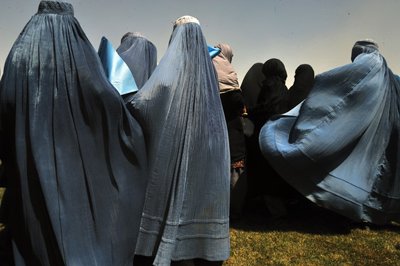KABUL: Afghan women are among the worst off in the world, violence against them is “endemic” and Afghanistan’s government fails to protect them from crimes such as rape and murder, a rights group said on Monday.

Afghan women. (Photo: Lynsey Addario / VII Network)
Human Rights Watch (HRW) said in a report the situation for women in Afghanistan is “dismal in every area”. “Women will not seek help because of their fears of police abuse and corruption, or their fears of retaliation by perpetrators of violence,” said the 96-page report, which is based on 120 interviews from different Afghan provinces.
Positive trend: Women in Afghanistan have only been allowed to return to work and education since 2001, when the Taliban were overthrown by US-led forces. “Whereas the trend had clearly been positive for women’s rights from 2001-2005, the trend now is negative in many areas ... it is a reflection of the power of conservative leaders who want to deny women their basic rights,” the report said. The report cites cases where rapists have been pardoned by the government, girls and women have been imprisoned for running away from home, rape victims have been charged with adultery and where women in public life have been murdered. It comes a week after the United Nations said violence and rape against women in Afghanistan was a problem of “profound proportions”.
Warlords: When President Hamid Karzai was first elected president of Afghanistan in 2004, he appointed three women ministers. Five years on, the minister for women’s affairs is the last remaining female in the cabinet. The report’s author said Karzai’s reliance on support from powerful former warlords has further restricted women from making progress in Afghan society and government, and attacks on women in public life seem to be worsening. “There are definitely some negative trends and attacks on women in public life is one of those,” said Rachel Reid, Afghanistan researcher for the Washington-based rights group.
----------------------
Some parts of the Human Rights Watch report titled “We Have the Promises of the World” (Women’s Rights in Afghanistan), Dec.6, 2009 (Download Full Report):
Violence against women in Afghanistan is endemic. A nationwide survey of 4,700 women, published in 2008, found that 87.2 percent had experienced at least one form of physical, sexual, or psychological violence or forced marriage in their lifetimes.
* * *
Fifty-seven percent of all marriages that take place in Afghanistan are classified as child marriages by UNIFEM (under the legal age of 16), and 70 to 80 percent as forced marriages.
* * *
The majority of girls still do not attend primary school, and a dismal 11 percent of secondary-school-age girls are enrolled in grades 7-9. Only 4 percent enroll in grades 10-12. While the number of both boys and girls attending school drops dramatically at the secondary school level, the decline is much more pronounced for girls.
* * *
Human Rights Watch interviewed girls who make journeys to school that require up to six hours of walking a day. While families are concerned about every child’s security, they are especially reluctant to send teenage girls who may be targeted for sexual violence or harassment. Only 19 percent of schools are designated as girls’ schools, with no girls’ schools in 29 percent of all educational districts.
* * *
The Afghan Penal Code does not criminalize rape and instead defines the offences of zina (extramarital sex, or adultery), pederasty (sexual relationships between men and boys), and violations of honor. Consequently, victims of rape can themselves be prosecuted for the “crime” of adultery. Although the crime of rape is contained in the new Elimination of Violence Against Women law, the language of “zina” remains, though there is greater clarity between forced and consensual zina.
* * *
In a study on arbitrary detention by the UN carried out between 2006-2008, research in 30 of 34 provinces nationwide found that in almost every case investigated, a rape victim appeared to have been charged with zina. This included a 15-year-old girl in Nangrahar who was abducted and raped by two men. They were later released on bail, while she was charged with zina. In another case, a 20-year-old in Nangrahar was sentenced to two years in prison after complaining to the local authorities that she was raped by her uncle.
* * *
In May 2008 President Karzai pardoned two gang rapists who had served only 2 years of an 11-year prison sentence.... For the victim, however, the story only gets worse. Prior to the rape, her son had been abducted by the man who allegedly ordered her rape; he has not been seen since. In May 2009, two weeks after the jailing of the man who allegedly ordered the rapes, the victim’s husband was murdered.
* * *
One local human rights official, who has assisted Sara [rape victim] and her family, described the rape: On September 6, 2005, at 8 a.m. in the morning Commander Karim sent his men to get Sara. They took her to a house. At the house they stripped her clothes off and raped her, three of them. Commander Karim was present. Not only did they rape her, they used a bayonet and raped her with the bayonet. She’s bleeding everywhere, and then they send her out on to the street and back to her house, so that everyone will see. People are present on the street. They put her underclothes on the street in front of people.
* * *
In March 2009, the Afghan President approved the Taliban-style Shia Personal Status law which imposes discriminatory and abusive regulations restricting the basic rights of many women. Its adoption provided a timely reminder of how vulnerable Afghan women are to political deals and broken promises.
* * *
The picture is bleak. But it is not too late to make progress. One hopeful sign is the determination and courage of Afghan women...



